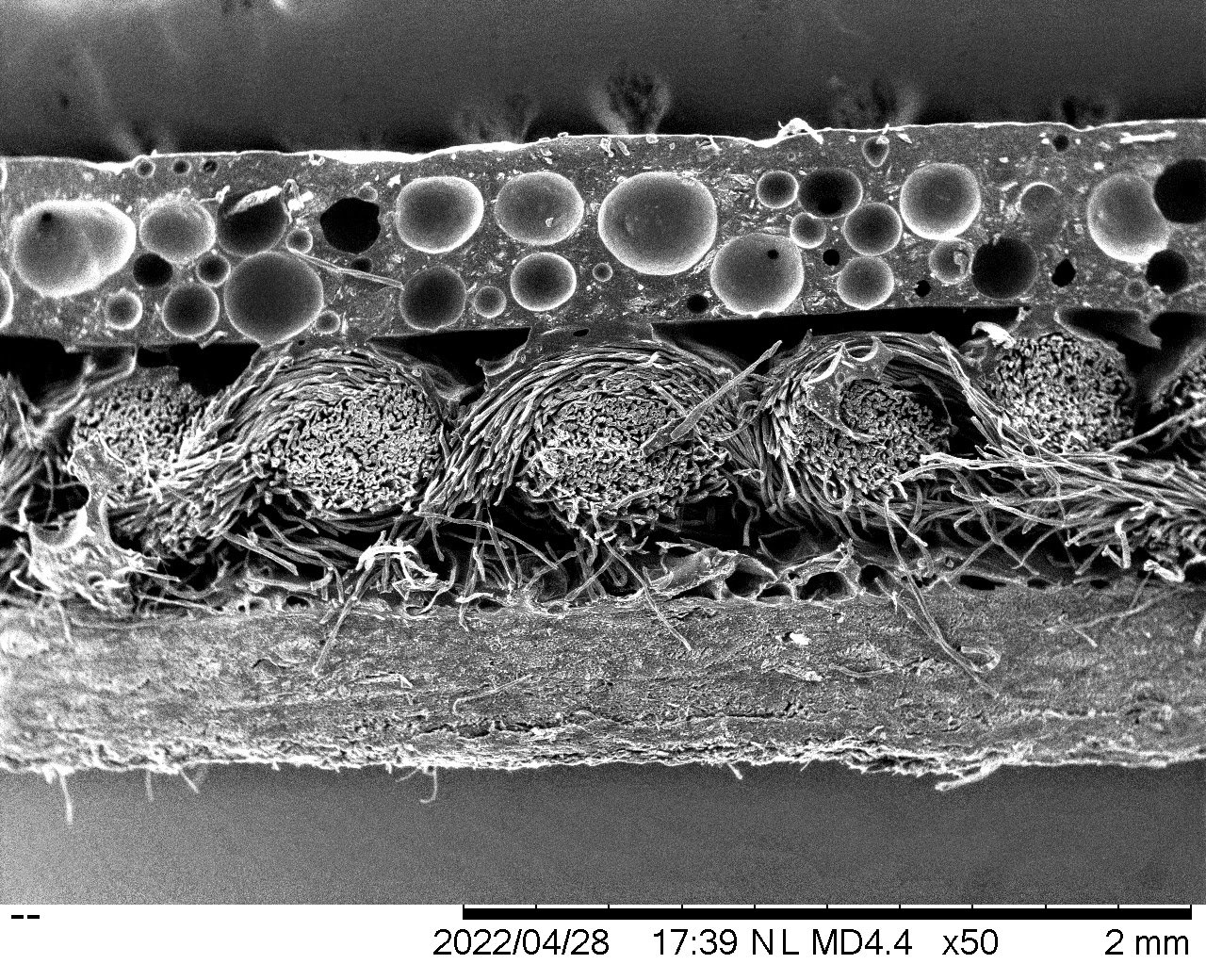Leather Microscopy
and the leather-like things we also call leather.
A side project.
This is a series of microscopy images of various types of leather, leather alternatives and things we may refer to as “{qualifier} leather”.
Much like milk is the liquid (cow, soy, almond, etc.) you put in your coffee or add to cereal, leather is the tough stuff in bags, clothing and food (sometimes). This is a job-centric definition used in everyday language that is occasionally contentious to industry insiders.
Open cell foam, from a Leather shoe upper.
Cactus Leather
Sample of Cactus leather by Desserto.
Three layers (from bottom to top)
500µm fibrous layer
Structural textile made of yarns
500µm thick polyurethane coating consisting of at least two layers (basecoat and top coat)
Three layers (from bottom to top)
500µm thick polyurethane coating consisting of at least two layers (basecoat and top coat)
500µm fibrous layer
500µm thick polyurethane coating consisting of at least two layers (basecoat and top coat)
Reishi
Samples of Reishi by Mycoworks
Sample from a Laptop Sleeve. The product is made three layers that are bonded together to form a package - one layer including mycelium and two layers of different types of leather.
Removing the animal based components of the package, Reishi’s construction is made up of a polyester felt with mycelium cladding.
From bottom to top
~250µm Mycelium, in layers of various porosity
~800µm Felt with sparsely populated mycelium (40-60% by mass)
70µm, but highly variable in thickness top layer of mycelium
15-20µm Topcoat
Sample from a hat. Construction is made up a textile with mycelium cladding.
From bottom to top
Mycelium
Some areas have been locally compressed
One region has what appears to be interspersed fibers of unknown composition
Textile reinforcement
Mycelium Layer
Finish/Topcoat
Total thickness is variable but ranging between 2 and 2.5mm. This product had a moderate to strong odor described by some as “sour pickles” or “oxidized fatliquor.”
Mirum
Sample of Mirum by Natural Fiber Welding
Sampled from Allbirds Plant Pacer shoe. Construction is a homogenous rubber coating over a textile backer.
From bottom to top
Structural Textile
Rubber Polymer
Sampled from a Pangaia accessory made from Mirum.
Construction is a homogenous rubber coating over a textile backer.
Structural Textile
Rubber Polymer
Automotive
Animal Skin
Sampled from a car interior.
Material is animal skin with a PU finish.
Detail of PU Finish - approximately 60-80µm thick.
Automotive
Synthetic Leather
Synthetic leather consisting of a textile with multiple layers of PU.
Detail of textile/coating interface.
Luxury Leather
Animal Skin
SEM
Animal Skin from a Luxury Fashion House.
From bottom to top
Corium (region with looser and larger fiber structure)
Grain (region with tighter structure)
Finish
Optical
Animal Skin from an Italian Luxury Fashion House.
From bottom to top
Corium (region with looser and larger fiber structure)
Grain (region with tighter structure)
Finish
Luxury Syntheic Leather
Synthetic Leather from a Luxury Brand. Consists of a textile coated with a PU surface.
Synthetic leather from a luxury brand. Samples from a bag.
From bottom to top
Textile (back)
Expanded foam
Textile
PU Coating
Footwear
Animal skin bonded to nonwoven textile. Sampled from a casual sneaker.
From bottom to top
Textile (back)
Animal Leather
PU Finish Layer
SEM
Flyleather. Samples from a casual sneaker.
Synthetic leather bonded to a foam. Sampled from a casual sneaker tongue.
From bottom to top
Foam
Textile
PU Finish Layer
Optical
Flyleather. Sample from a casual sneaker.
Apple Leather
Sample of AppleSkin
SEM
Sample is made from a polyester textile treated/impregnated with a polyurethane coating. The filed patent claims powdered fruit waste is mixed into a polyether resin which is cross linked with isocyanate.
From Bottom to Top
Structural Textile
Polyurethane Layer
Finish Layer
Optical
Optical microscopy of the same sample and region.
Pieces of material are embedded in the blue polyurethane region, these are presumed to be apple pomace.
The white fibers are the structural textile.
Fruit Leather
From Trader Joes’ Fruit Leather Wrap
Optical
Fruit Leather - stitched image
SEM
Fruit Leather - Apple Strawberry Flavor.
This was a relatively thick slab or material. The sample was largely homogenous with few observable air pockets.
Sample surface quickly degraded under the electron beam.
Paper Leather
Sample of Paper Leather from a small pouch
Cork Leather
SEM
Sample is a layer of cork with several layers combined into a package.
From Bottom to Top
Structural Synthetic Textile
Synthetic Layer
Structural Fibers
Synthetic Foam Layer
Cork
Optical
View of entire cross section.
Optical
Cross section detail.
The interface between the black and beige region has structural fibers. These fibers are likely synthetic and appear to be transparent in color.
Leaf Leather
SEM
Sampled from a wallet.
From bottom to top
Synthetic nonwoven textile
Teak Leaves
Finish Coating (approximately 60-70µm thick)
Optical
Sampled from a wallet.
From bottom to top
Synthetic nonwoven textile (white)
Teak Leaves (Yellow)
Finish Coating (transparent/amber)

























